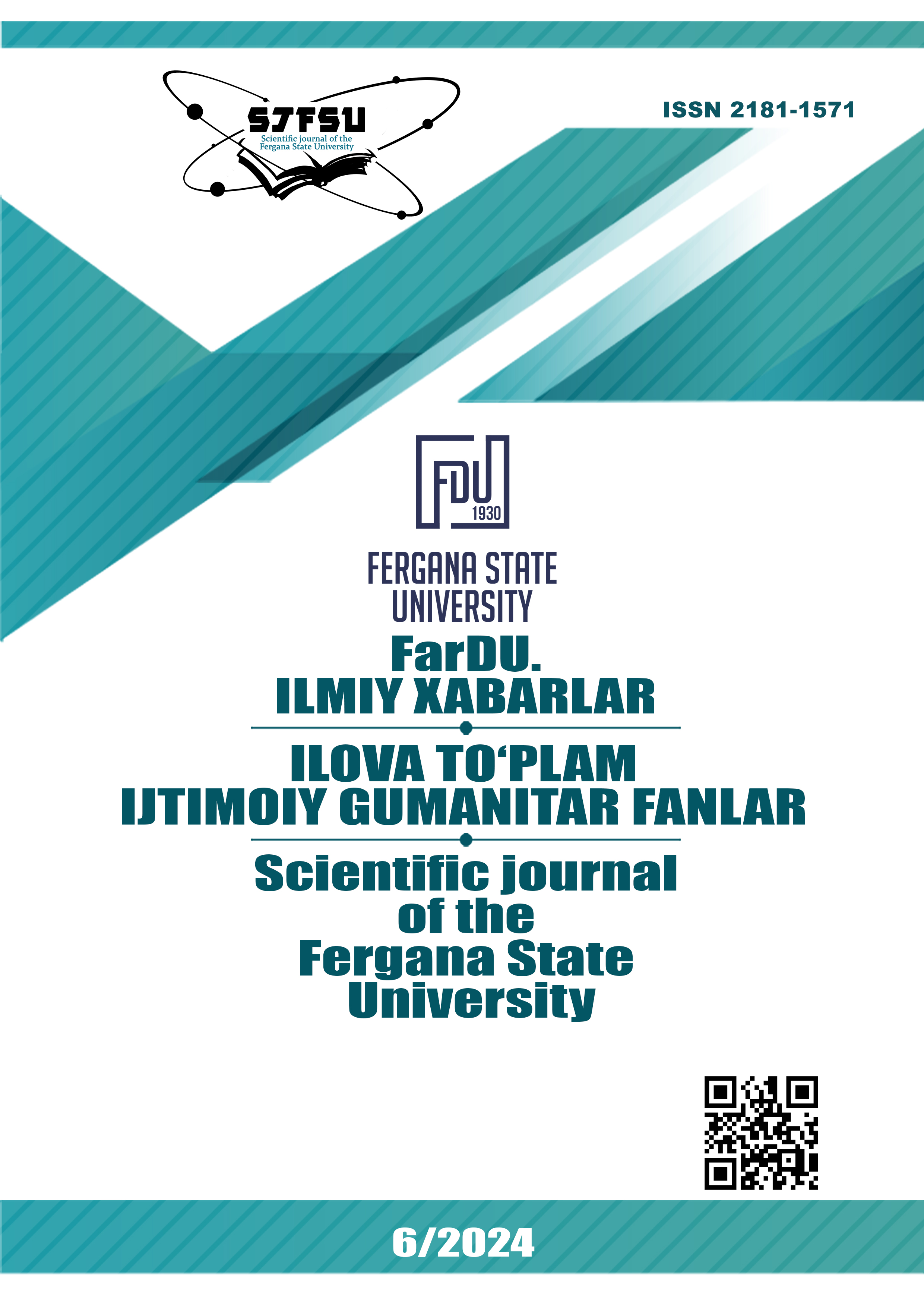POETIC SYNTAX: INTERPRETATION OF EXPRESSIVE AND EXTRALINGUISTIC MEANS
Keywords:
linguopoetics, poetic syntax, expressology, emotionality, expressive speech, actual articulation, extralinguistics, individuality, syntactic figure, figurativeness, affectivity.Abstract
The article reveals issues of poetic syntax, which is considered one of the main areas of linguapoetics, as well as the main features of expressive and extralinguistic means involved in poetic speech, which is considered the main object of study of poetic syntax. It is also emphasized that expressiveness is another issue that should be paid attention to when studying the syntactic features of poetic speech, and the problem of expressiveness has attracted the attention of linguistic researchers for many years. Another issue that needs to be addressed within the framework of poetic syntax is the issue of extralinguistic factors influencing the creation of poetic speech. In the process of creating speech, a person does not rely only on linguistic factors to express thoughts. There are also categories that have an external influence on the formation of speech, which in linguistics are called extralinguistic factors. In general, the influence of expressive and extralinguistic means in the formation of poetic speech is noticeable in the features that we touched upon above. Only if one or another type of extralinguistic means actively influences the creation of one speech, is it inactive in another speech. Expressiveness plays an important role in the manifestation of the influence function, which is considered one of the most basic functions of language. This category is expressed in poetic speech using various linguistic units and speech means. As a result of the effective use of expressiveness in poetic speech, the formation of the effect of emotional impact has been proven.
References
Винокур Г.О. О языке художественной литературы. – Москва: Высшая школа, 1991. – С.447.
Патроева В.Н. Типы и функции осложняющих конструкций в языке русской поэзии XVIII-XIX в.в. Автореф… дисс…док…фил…наук. СП, – С 53.
Abdupattoyev M.T. Sintactic composition of poetic speech // Central Asian Journal of Literature, Philosophy, & Culture (CAJLPC) ISSN: 2660-6828 Table of Content - Volume 3 | No 4 (Apr 2022). Page: 30-35.
Абдуллаев А. Экспрессивлик ифодалашнинг синтактик усули. Тошкент. “Фан” 1987, - Б 86.,Умурқулов. Поэтик нутқ лексикаси. Тошкент “Фан”. 1981, - Б. 110
Королева Е.И. Экспрессивные грамматические средства языка в аспекте функционально-семантического поля(наматериалесовременнойбританской баллеристики). Автореф… дисс…канд…фил наук. Екатеринбург. 2016, - С 32.
Романова Н.П. О метаязыке раздела лексикологии, изучающего экспрессивную лексику // Экспрессивность на разных уровнях языка : межвуз. Сб.науч. трудов. Новосибирск, 1984. С 6-19.
ЖербилоТ.В. Словарь лингвистических терминов. Изд. 5-ое.допoлн. Назрань: «Пилигрим», 2010, - С 486 .
Abdupattoyev M.T.Unusual Conections As Forming literary texsts. The American journal jf social science and edicasion innovations/ 2021. Volime – 03, Issue – 02-28. Page: 177-182. DOI: https://doi.org/10.37547/tajssei.
Ричард Медхарст. Японская поэзия хайку: исскуство краткости.https: // www.nippon.com. (мурожаат куни: 21.04.2021)
Downloads
Published
Issue
Section
License
Copyright (c) 2025 Scientific journal of the Fergana State University

This work is licensed under a Creative Commons Attribution-NonCommercial-NoDerivatives 4.0 International License.
How to Cite
Most read articles by the same author(s)
- , STATISTICAL ANALYSIS OF TEXT , Scientific journal of the Fergana State University: No. 3 (2024): Scientific journal of the Fergana State University. Application set (Social humanities sciences)
- , ACTUALIZATION AND ACTUAL DIVISION IN POETIC SPEECH , Scientific journal of the Fergana State University: No. 3 (2024): Scientific journal of the Fergana State University. Application set (Social humanities sciences)
- , QUESTONS OF FUNCTIONAL SUNTAX OF THE UZBEK LANGUAGE , Scientific journal of the Fergana State University: No. 6 (2024): Scientific journal of the Fergana State University ADDITIONAL COLLECTION (Social humanities sciences)
- Muhammadtohir Abdupattoev, LINGVOPOETIC FEATURES OF THE AUTHOR’S IDIOSTYLE , Scientific journal of the Fergana State University: No. 5 (2025): FarDU. Ilmiy xabarlar jurnali (FILOLOGIYA)

